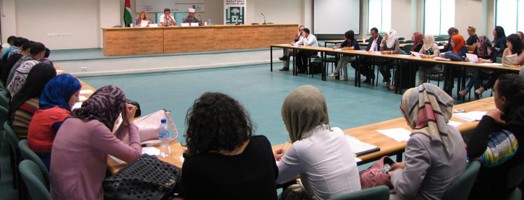Khul’ (Wife-initiated Divorce) from the Historical Perspective of Islamic Jurisprudence Theories
On Tuesday, 11 September 2012, the Institute of Law (IoL) at Birzeit University organised a legal encounter on Khul’ [Wife-initiated Divorce] from the Historical Perspective of Islamic Jurisprudence Theories. Delivered by Dr. Lena Nather, UC Berkeley School of Law, His Eminence Judge Yousef Id’eis, Chief Justice and President of the High Family Court, provided an illuminating commentary on the presentation.
In her opening remarks, Dr. Nather explained that the dispute between proponents and opponents over Khul’ is not a question of its legal status. In fact, Khul’ is taken for granted by all jurists and all major books on Islamic jurisprudence regulate it. However, the dispute concerns whether it is permissible to oblige husbands to admit it or give judges the authority to enforce it. Dr. Nather also explored whether Khul’ is a means to divorce a wife without fulfilling her rights.
Dr. Nather overviewed interpretations of some Quranic verses related to Khul’ or Iftida’ [a monetary compensation that the wife gives to ransom herself]. She reviewed relevant versions of the history of Khul’ in various jurisprudence opinions, indicating that, in the life of Prophet Mohammed, women initiated divorce and men divorced their wives. Highlighting a negative presentation of Khul’, Dr. Nather asserted that many jurisprudence opinions have associated wife-initiated divorce with Nushuz [recalcitrance or disobedience by the wife] or gender-based violence. Dr. Nather concluded her presentation with these questions: Is it necessary that the wife who initiates divorce be Nashez [recalcitrant] or subjected to violence so that she can benefit from Khul’? Is it necessary that the husband utters the pronouncement of divorce to dissolve marriage in the case of Khul’?
His Eminence Judge Id’eis emphasised women’s right to freedom of choice prior to marriage. If a matrimonial dispute is insoluble, reconciliation is impossible and the wife feels that she would sustain more damage if the marriage continues, she has the right to apply for a separation by divorce. Regardless of the husband’s decision, the wife’s dowry will, in this case, be redeemed in full. According to Sheikh Id’eis, Khul’ means that once a man concludes a marriage contract with a woman, who is neither divorced nor the wife of another man, that woman is entitled to return the gifts which he offered or give a monetary compensation with which she ransoms herself in order to separate from him. His Eminence further explained that the woman who resorts to Khul’ must file an application to the Family Court, providing that she hates her husband and can no longer live with him. She should make clear legal justifications for her application. The judge will first attempt to reach a reconciliation between both parties. If untenable, an agreement is made whereby the wife waives a sum of money to obtain Khul’.
Dr. Nather is a researcher specialising in Islamic law and its history. She has published several academic articles about women in Islamic history and about Islamic law prior to the emergence of Islamic legal schools. Dr. Nather challenges the common reification of ‘Islamic law’ as a static, monolithic whole. She offers an alternative, historical understanding of the ambiguous and ever-changing nature of Islamic legal orthodoxy. Dr. Nather’s research critiques interrelated discourses to offer a more historically accurate and responsible understanding of Islamic law.
The legal encounter brought together a select number of researchers, members of the legal community, representatives of civil society actors, as well as law students at Birzeit University and other Palestinian universities.
The legal encounter was organised with support from Konrad Adenauer Stiftung.










